- Home
- C. C. Humphreys
Jack Absolute Page 10
Jack Absolute Read online
Page 10
Jack looked to Até and his friend peered back at him through his spectacles. He had acquired a new pair in London, delighted with an improvement that had occurred in their time in India; these were called ‘bi-focals’ and had a reading lens occupying the lower half of the glass. The contrast between these and the shaved head and war paint had given Jack much amusement, though Até had not seen the humour. A copy of Clarissa by Samuel Richardson lay on his tattooed chest. He did not usually read novels, preferring philosophy or Shakespeare, but Burgoyne had thrust it at him on the voyage over and he felt obliged to the General to finish it. After two days in the forest, he was nearly done.
They waited for the chorus that should follow the single cry. But it was not long before the one voice cried once more, from a little nearer, a longer ululation ending in a series of sharp yelps.
There was something strange in it. Jack tipped his head. ‘Lone wolf?’
Até was folding his spectacles, putting them and the book to the rear of their birch bark, half-moon lean-to. ‘Yes,’ he said, reaching for his gun, ‘but not an animal one.’
Jack had heard it too. Someone was moving through the woods towards them. Their shelter was set back from the main path, hidden by a thicket of young birch. Priming their fusils with a sprinkle of powder in the pan – they were already loaded – they moved swiftly down to the trail. Jack’s raised eyebrows drew the slightest of nods from Até, who swung himself into the lower branches of a beech. Jack lay just off the path, squinting along the barrel down the path that led to the Rebel lands.
It was not a long wait. Within moments, they heard the sound of feet slapping the earth. Or rather one foot, then a dragging sound accompanied by a harsh exhalation. And there were other sounds beyond these. Straining, Jack could make out at least three other footfalls, maybe more, coming fast. Faster certainly than the one they obviously pursued.
The first man to appear looked as though he had run for miles. He was dressed, much as Jack and Até themselves, in breech cloth, moccasins, and little else. But the black and gold paint that striped him from crown of head to knees was smeared and, Jack instantly saw, run through with red. This was not done in the formal patterns of the paint. This was blood. It spread across the body in a spider’s web, streaming from beneath the hand the man ineffectually clutched to his side. And Jack saw that the leg, the one that dragged, had another wound, also pulsing red.
They saw him and a moment later he was upon them. Laying aside his gun, Jack stuck out a leg.
The wounded warrior had been glancing back so he went down hard. But he rolled twice and came up to his knees, a knife in his hands. Jack followed, tomahawk drawn, but the blade halted him. Besides there were friends as well as foes in this forest.
There was a moment of near silence; only a moment, because both men heard, above the desperate breathing of the kneeling one, the rapid approach of those other feet. Maybe two hundred paces through the brush. Maybe less.
‘Mohawk?’ whispered Jack. He said it in English and the man’s eyes widened.
‘Cayuga. I seek the forces of the King.’
‘You’ve found them. Some, at least. Those who follow?’
‘They serve the Rebel. They seek to stop my mouth.’
‘How many?’
‘Five. I think five.’
Jack had a moment to believe or not. When he did, he pursed his lips and whistled. First, just the once and like a spruce partridge, the best of the eating birds, indicating to Até that they had found a friend. The second time, five quick bursts with the aid of his fingers (a quail rising in alarm from a nest) gave the number of the enemy. Then he stepped off the path and reached down for his musket.
The first of the pursuers crested the slight rise and yelped in triumph when he saw the fallen Cayuga, an Ironwood war club lifting as he ran. He was just about to throw it when Jack fired, the buck-and-ball load taking him in the chest, spinning him back. A second warrior hurdled the falling man, came on without a pause, shrieking, his own weapon rising, then spinning from his grasp as a hole opened in his side, the sound of Até’s shot coming almost simultaneously. He cried out, staggered, tried to run on, fell slithering towards them.
Behind, three other warriors appeared, hesitated. In that still moment, Até dropped from the tree straight into their midst. His tomahawk rose, fell; another blocked it. Wood cracked on wood, metal on metal, as the metal heads slid towards each other, clashed together. Another blade sliced down towards Até’s back, but the warrior was aiming where Até had been. He’d used the interlocked heads to pull himself and his opponent off the path.
Jack now had a target. Drawing his own tomahawk again, he threw, spinning it fast through the air. Somehow, the man saw it come, raised his own to deflect it, skittering it into the woods. Jack only had a moment to curse his choice to throw before he was dealing with its consequences – a screaming warrior running at him, tomahawk raised high up to that point where the killing strokes begin.
He’d held on to his fusil in his left hand. Now he snapped the butt up into his right, raised the weapon square across his head, just in time. The tomahawk blade drove into the gunstock an inch from Jack’s fingers. He pulled his right arm down sharply, twisting his body aside. The running attack, the slight slope, Jack’s sudden movement, all caused the warrior to slip past, fall to one knee. But he wrenched the weapon from the stock and sweeping around, cut at Jack’s extended knee. Jack leaped back, using the fusil almost as a sword, sweeping the barrel down. The tomahawk, the better balanced of the two weapons, knocked the musket from Jack’s grasp. He staggered back and the warrior, with a shout of triumph, raised his blade high and stepped forward to deliver the death stroke.
Jack reached his left arm across his body and drew his dirk from the sheath at his right side. In the same movement he threw it underhand, though it was not truly designed to be thrown, and he was aware, even in that instant, of the poor results he’d obtained from the far more airworthy tomahawk. But the blade flew effectively enough, taking the warrior in the throat just as he was about to strike. It halted him in mid-blow, a look of surprise, even reproach taking over his face. Then he sat down very suddenly, legs thrust out before him. A gurgle, it might have been a curse, and he lay back.
It had taken no time at all. Jack turned to see Até still entwined with his opponent, spinning around as each tried to loosen the other’s grip on their tomahawk. Even as he watched, his friend leaned back, then suddenly forward, his head cracking down on the opponent’s nose. With a cry the man lost his hold on his own weapon, and, with it, his life.
The last of the pursuers had not moved from where the fight had begun. Now, he looked quite slowly at the bodies of his friends, at Jack, at Até. Then he nodded once, turned, and ran.
‘Yours.’ Jack indicated the path. Até paused only to jerk his tomahawk’s head from his victim’s body and he was gone. Twin footfalls faded.
Jack turned to the Cayuga brave. The man had fainted and, looking at his wounds, Jack could see why. Both chest and leg must have bled extensively and a terrible pallor underlay the dark skin. Jack bent and lifted the man, carrying him the few paces to the shelter. There, he swiftly ripped apart a shirt reserved for cooler nights and wrapped the swathes of cloth around the wounds. The leg injury was deep but would heal with time. The other, in the side of the chest, was more serious; Jack felt the ball might still be in there. The man needed a surgeon and swiftly.
As Jack bound the more serious wound, the man stirred then started.
‘Easy, friend. My name is Jack Absolute. You are safe now. Rest.’
The man shook his head as if to clear it. ‘I cannot. My name is Samuel. Water?’ When Jack had fetched it and he had drunk deep – though it caused him pain – he said, ‘I have wampum for the King’s army.’ He nodded to the pouch that Jack had removed from his shoulder. Jack opened it, pulled out the belt of beads. The majority were purple, though white ones were spaced along it in rectangles the size of a thumb
.
‘I am not gifted in the reading of wampum. I know this means danger, and that it is incomplete.’
‘There was not time to finish it. I bring the news … here.’ The man touched his mouth. ‘But Molly Brant sent this so that my words would be believed. I speak what she would make into wampum.’
‘Molly Brant? Joseph’s sister?’
The man nodded. ‘She lives still in Canajoharie, down the Valley. It is full of Rebels. She listens and sees them gather. They are coming here, their soldiers.’
‘Regulars?’ Jack would be surprised to see Washington’s regular army, the ‘Continentals’ as they were called, this far west. Not with Burgoyne marching down from the north and Howe from the south.
The man shook his head. ‘Tryon County Militia. But many. They come to fight for the fort.’
Jack frowned. The Militias varied in quality and training, summoned as they were only for short bursts of service. But the best of them were doughty fighters. ‘We had heard this Militia was fearful, that they would not fight.’
‘A girl was killed. White girl. By tribesmen allied to King George, it is said. It makes them angry.’
‘How long?’
The man looked east. ‘Soon. Maybe even tomorrow. They set out after me but it is not far. They …’
They both felt the faint vibration on the earth. Jack picked up a pistol, but, a moment later, Até was before them. He threw something down in front of Samuel – a long black braid attached to a piece of skin.
‘The last of your pursuers.’ Até toed the scalp a little forward. ‘Oneida, I think.’
‘Yes. Oneidas love the Rebelmen. As do the Tuscaroras.’
Jack looked up. ‘Two of the Six Nations. That confirms what we heard on the way to the gathering, Até – we are not the only ones fighting our own.’
‘Did you not say, Daganoweda, that all wars are civil wars?’
‘I did.’ He looked down at Samuel. ‘If I help you, can you make it to Fort Stanwix? It is about an hour’s march, maybe a little more with your wounds. I think the Colonel will need to hear it from you. He doesn’t value my opinions.’
Samuel raised himself on one elbow. ‘I must.’
Até reached into the shelter. In a moment, all his possessions were across his shoulders.
‘I will …’ He nodded down the path in the direction the enemy would come.
‘I’ll be back by dawn.’ Jack was helping Samuel to stand. Once on two feet the Cayuga warrior shrugged off the supporting hands. ‘And hopefully I’ll bring an army. At the creek?’
‘Oriskany?’
‘Aye. Oriskany.’
With a flick of two fingers at his brow, Até loped off down the path. Samuel had already begun to limp the opposite way, through shafts of late afternoon sunlight slanting through the canopy. Before he followed, Jack went to seek his thrown tomahawk. Rooting among the undergrowth, he finally found it, straightened … and was struck by how peaceful everything was, all the colours of the forest in harmony. Then, turning to follow, he looked down, saw the one colour that was out of place, because the season for it had not yet come. Red. Their victims’ blood, on the bodies they would have to leave, on the forest’s floor. Jack knew, that if Samuel’s message was heeded, the hue would soon be spread much wider under the canopy.
This time there was no question. The urgency of the matter demanded that Jack was part of the war council within their leader’s pavilion – though St Leger, drunk as a lord, made much play, before his crimson nose, of a large stained handkerchief that he regularly anointed from a flask of perfume. The scent was of the very cheapest, cloying and more noxious, to Jack, than anything that could come from a bear. And it combined unfortunately with both the grease sported by several of the Native councillors and the pipe smoke many others were using to ward off the stench. The approach of evening had barely tempered the heat of the day. Within minutes of the council commencing, the tent smelled like a combination of bordello, sweat lodge, and abattoir.
Yet to Jack, the nasal assaults were as nothing to the main irritation under the canvas. There, right next to the swaying, sweating Colonel, and as apparently in favour as Jack was out, stood a man in the dark green uniform of a major of Jaegers, the Light Infantry from Hesse-Hanau. He was a senior officer with the final reinforcements, newly arrived from Lake Ontario. But on Hounslow Heath he’d been Banastre Tarleton’s Second-Second, and in a secret message in Quebec he was, Jack felt certain, ‘Diomedes’ of the Illuminati. Here though he was, once again, the Count von Schlaben.
As soon as he’d seen him, Jack had cursed Burgoyne silently. The General had promised to keep this dangerous man tight to him. In the chaos of campaign Von Schlaben had obviously contrived to slip away. Burgoyne would not know where he had gone and if he’d finally found out, any warning sent would almost certainly be far behind the German. And Jack could see, by the way St Leger already deferred to the Count, that speaking out against him would have no effect, could only hurt Jack’s standing in this company further.
And, once again, Von Schlaben opposed Jack on everything that mattered. His position as a leader of the German contingent gave him a voice. His was as soft and persuasive as ever as he counselled caution, consolidation, even withdrawal in the face of the approaching foe. Surely better to preserve these forces and return them to Burgoyne if the Fort could not be taken quickly and was soon to be relieved? Even St Leger demurred at this. He did not want a return to a subordinate position where both his incompetence and his drinking could not help but be noticed. But he agreed that his forces should not be split – his regular forces anyway.
‘They shall maintain the siege,’ he had drawled. ‘I am convinced the defenders are soon to falter. Since my esteemed ally Joseph Brant here and, uh, Captain Absolute are so convinced of the prowess of their tribesmen, let them show it. Let them to prove their vaunted forest fighting skills. Let them do it alone.’
Jack had no need to raise his voice in the counterarguments that followed. The two Loyalist leaders, John Butler and John Johnson, commanded troops who were nearly all farmers and landowners, like themselves, in the Mohawk Valley they were due to march through. It was their farms that had been appropriated by the Rebels, their neighbours, former friends and, in many cases, even brothers and fathers who formed the Militia that marched to relieve the Fort. This was the personal war they had come to fight. They would go with the Mohawks and their allies and join in the ambush. And, much to Joseph Brant’s disgust, a Seneca sachem declared that his people, as had been promised them, would come along and watch.
It was far from perfect. But it could be enough. From Samuel’s report, the Militia numbered about six hundred men and the Allies were mustering about the same – four hundred Native, two hundred Loyalist – with the advantage of surprise and of choosing the terrain. Both he and Joseph knew the valley and, like Até, had spotted the ravine at Oriskany, about six miles from Fort Stanwix, as a likely site. Yet when Jack saw the swiftest of smiles appear on Von Schlaben’s lips, he suddenly felt less than sure.
The meeting broke up, participants gratefully fleeing the fug to go and ready their men. They were to march in one hour. Joseph immediately set off for the Mohawk camp. Von Schlaben had preceded them and Jack saw his green coat disappearing down a side trail towards the German lines. They had set up in a small clearing just away from the main encampment. On a whim, Jack followed.
He caught up with him down a dip, in a small stand of fir. Their dense needles screened the two men from sight and the rallying trumpets were muted there. Von Schlaben had stopped, was staring ahead. Drawing nearer, Jack saw the reason.
A rattlesnake lay curled up, slap in the centre of the path. It was a large one, several years old, its rattle at least seven ligaments long. It raised this as it confronted the Count, shook its warning at him, its tongue slipping in and out, head weaving from side to side.
‘Communing with a cousin, Count?’
The German half turned towar
ds Jack, endeavouring to keep his eyes in both directions, that faint smile as ever on his lips.
‘Captain Absolute. My, such deadly forest creatures both fore and aft. What is a poor townsman to do?’
‘I am flattered you consider me deadly,’ Jack left the slightest of pauses before adding, ‘Diomedes.’
If he hoped the name would provoke a reaction he was disappointed.
‘My first name is Adolphus, not … whatever it was you just said. Though I hardly think we know each other well enough to be on such terms.’
‘Oh, I don’t know.’ Jack had stopped about four paces away. ‘I think one should always be on easy terms with a man who has tried to have one killed.’
‘I?’ There was no real denial in the tone. His gaze swung back to the snake, which had begun to move. Certain of its precedence on the path, it uncoiled and, with a final warning rattle, slithered off into the brush.
Von Schlaben shook his head. ‘A nasty way to die, I am told.’
‘Very. You should try it.’
The German’s pallid eyes moved back to Jack. In a voice devoid of inflection, he said, ‘You wish something from me, Captain Absolute?’
Jack took a moment to look the dark green uniform of the Jaeger officer up and down. ‘Do you qualify for this role?’
‘We all play many roles, Captain. I have seen some military service, yes.’ He gestured with his chin to Jack’s encampment garb of green wool shirt and buckskin leggings. ‘Do you qualify for yours?’
There was a moment’s appraising silence between them. Jack broke it. ‘I know why you set that young lunatic on me in London. You would try to prevent me in the duty I perform now – rousing the Natives to fight for the King.’
‘I would?’ Again, it was barely a question.
‘I am curious. What do you consider your duty?’

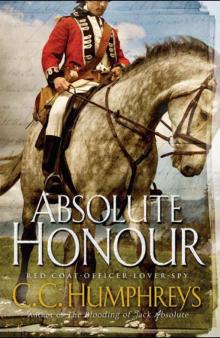 Absolute Honour
Absolute Honour Plague
Plague Blood Ties
Blood Ties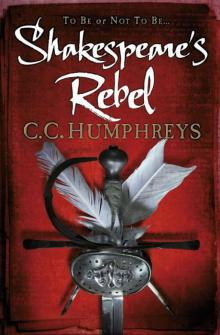 Shakespeare's Rebel
Shakespeare's Rebel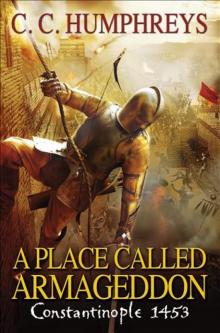 A Place Called Armageddon
A Place Called Armageddon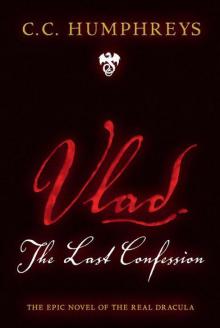 Vlad: The Last Confession
Vlad: The Last Confession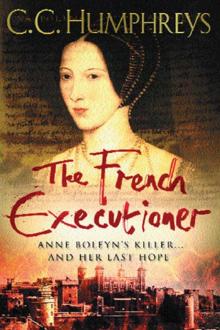 The French Executioner
The French Executioner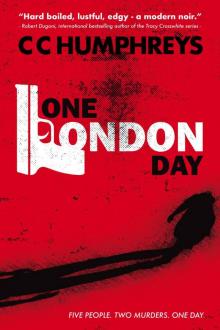 One London Day
One London Day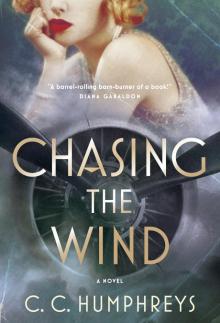 Chasing the Wind
Chasing the Wind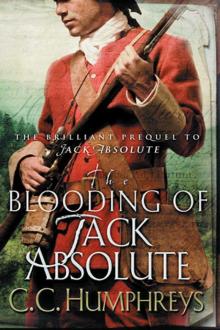 The Blooding of Jack Absolute
The Blooding of Jack Absolute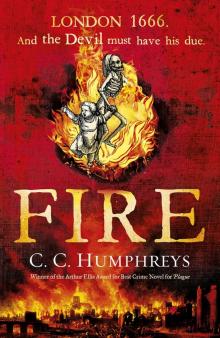 Fire
Fire